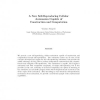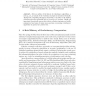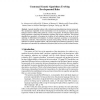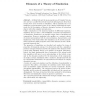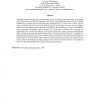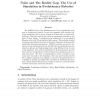102
click to vote
ECAL
1995
Springer
15 years 5 months ago
1995
Springer
We present a new self-reproducing cellular automaton capable of construction and computation beyond self-reproduction. Our automaton makes use of some of the concepts developed by...
138
click to vote
ECAL
1995
Springer
15 years 5 months ago
1995
Springer
After an outline of the history of evolutionary algorithms, a new ( ) variant of the evolution strategies is introduced formally. Though not comprising all degrees of freedom, it i...
131
click to vote
ECAL
1995
Springer
15 years 5 months ago
1995
Springer
Neither `design' nor `evolutionary' approaches to building behavior-based robots feature a role for development in the genesis of behavioral organization. However, the n...
168
click to vote
ECAL
1995
Springer
15 years 5 months ago
1995
Springer
A genetic algorithm scheme with a stochastic genotype/phenotype relation is proposed. The mechanisms responsible for this intermediate level of uncertainty, are inspired by the bio...
128
click to vote
ECAL
1995
Springer
15 years 5 months ago
1995
Springer
Arti cial Life and the more general area of Complex Systems does not have a uni ed theoretical framework although most theoretical work in these areas is based on simulation. This ...
114
click to vote
ECAL
1995
Springer
15 years 5 months ago
1995
Springer
Although recently there has been an increasing interest in studing genetically-based development using Artificial Life models, the mapping of the genetic information into the phen...
105
click to vote
ECAL
1995
Springer
15 years 5 months ago
1995
Springer
In this paper we investigate the phenomenon of multi-parent reproduction, i.e. we study recombination mechanisms where an arbitrary n > 1 number of parents participate in creati...
